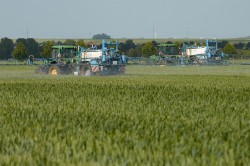Press Release, 03. April 2019
Risk assessment of pesticides
Scientists demand revision of approval process
According to European Union guidelines, the use of pesticides must not lead to a decline in biodiversity. A large number of studies have revealed, however, that the current use of chemical pesticides has harmful effects on ecosystems and biological diversity. Consequently, an interdisciplinary team of scientists is urging politicians and relevant authorities to take the actual state of ecosystems more into consideration and to make the necessary amendments to the approval procedure for pesticides. The study is being published today in the journal Environmental Sciences Europe; it additionally contains suggestions on how to achieve the specified environmental objectives.
The approval mechanism for pesticides as currently applied fails to reach the envisaged environmental standards and contributes to the loss of biodiversity. Consequently, a group of experts, which included among others scientists from the Helmholtz Centre for Environmental Research (UFZ) and the University of Koblenz-Landau, is urging politicians and relevant authorities to give greater consideration to the actual state of ecosystems and amend the approval procedure for pesticides. The objective is to close the gap between the outcome intended by current legislation and reality.
Prof Matthias Liess, Head of the Department of System Ecotoxicology at the Helmholtz Centre for Environmental Research (UFZ), is a member of the expert group. He states: "For many years now, our research work has revealed that there is a high concentration of pesticides in the bodies of water in agricultural landscapes, exceeding the official thresholds in many cases, which causes local extinction of a large number of aquatic organisms that constitute an important link in the food chain. To protect our rivers and lakes in line with legal requirements, it will not only be necessary to amend the approval procedures for pesticides but also change the way these products are applied in agricultural practice."
Prof Ralf Schäfer of the University of Koblenz-Landau likewise expresses his concern: "The current approval procedure continues to ignore to a great extent the actual state of the environment," he says, continuing that it is the duty of the European Food Safety Authority (EFSA) and the European Commission to implement changes and ensure that the different sensitivities of the organisms occurring in the various ecosystems are taken into more consideration in the approval procedures.
Furthermore, the authors point out that the sensitivity to pesticides is influenced by other environmental factors, including, for example, the climate, the distance to other habitats and the presence of other stress factors, such as excessive nutrient inputs or extreme climatic events. For this reason, it is common agricultural practice for more than one pesticide to be used on the fields, either mixed in one tank or sprayed one after the other. This means that organisms are generally exposed to mixtures.
In the opinion of the expert group, this is an aspect that is currently not being given sufficient attention. The scientists therefore recommend taking agricultural practice and the actual state of the environment into greater consideration in risk assessment and suggest a series of adaptation measures. A first step should involve applying stricter safety factors in the approval procedure, additionally taking account of the costs and benefits of new products during approval and also reviewing whether there are, for instance, more environmentally compatible alternatives already on the market. In the medium term, however, the current approval procedure should be replaced by a limited approval under which the environmental impact can be examined in selected areas subject to real-life application conditions. "Such a monitoring system can build on the environmental monitoring currently performed as part of the European Water Framework Directive (WFD) and use established indicator systems for the effects of pesticides in bodies of water (http://www.systemecology.eu/indicate/)," says Prof Liess.
Publication:
Schäfer R.B., Liess M., Altenburger R. et al.: Future pesticide risk assessment - narrowing the gap between intention and reality, Environmental Sciences Europe, 2019, https://enveurope.springeropen.com/articles/10.1186/s12302-019-0203-3
Further information
Prof. Dr. Matthias Liess
Head of Department System Ecotoxicology
matthias.liess@ufz.de
UFZ press office
Susanne Hufe
Phone: +49 341 6025-1630
presse@ufz.de
In the Helmholtz Centre for Environmental Research (UFZ), scientists conduct research into the causes and consequences of far-reaching environmental changes. Their areas of study cover water resources, ecosystems of the future, environmental technologies and biotechnologies, the effects of chemicals in the environment, modelling and social-scientific issues. The UFZ employs more than 1,100 staff at its sites in Leipzig, Halle and Magdeburg. It is funded by the Federal Government, Saxony and Saxony-Anhalt.
www.ufz.deThe Helmholtz Association contributes to solving major challenges facing society, science and the economy with top scientific achievements in six research fields: Energy; Earth and Environment; Health; Key Technologies; Matter; and Aeronautics, Space and Transport. With some 39,000 employees in 19 research centres, the Helmholtz Association is Germany’s largest scientific organisation.
www.helmholtz.de
